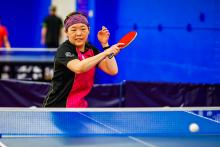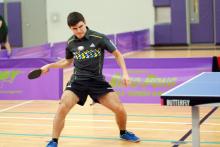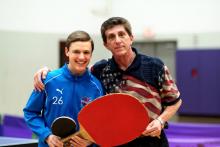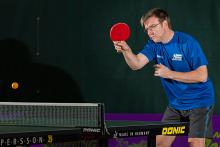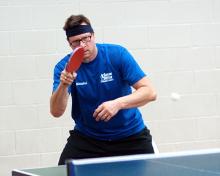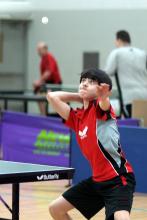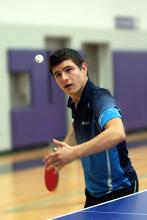by Samson Dubina on Sun, 2023-09-24 17:44
Mentally Strong vs Mentally Weak
Some Random Stranger, “He definitely shouldn’t have done that!!!”
Samson, “Shouldn’t have done what?”
Some Random Stranger, “He shouldn’t have chooooooed so loudly every time he hit the net or edge with a lucky shot!!! He made me mad! When I’m mad, I play so determined!”
Samson: “So what happens when you aren’t mad?”
by Samson Dubina on Mon, 2016-03-14 09:22
Written by Coach Seth Pech
by Samson Dubina on Wed, 2015-09-23 11:15
Learn to slow-down your opponent
IN ORDER TO SLOW DOWN YOUR OPPONENT, YOU MUST FORCE HIM TO MAKE A DECISION.
Let me explain...
During a match, most of the mental toughness comes between points. Being mentally tough means...
1. Evaluating the previous point for what you did right
2. Evaluating the previous point for what you did wrong
3. Encouraging yourself
4. Planning some general tactics if you are receiving
by Samson Dubina on Mon, 2015-07-27 08:26
Get over your tournament jitters
Many US players train hard all year long for that one important tournament. Then, the defining moment arrives... ***drum roll***
Nerves take over...
The pressure of the event takes precedence in their mind...
The opponent gains momentum...
And it results in another failed performance! >OUCH<
by Samson Dubina on Thu, 2014-07-10 22:32
Feeling Moody? Read this article!
Be Happy
At tournaments, some players are very happy and others are very disappointed.
Is it the winning that changes the mood?
Or is it the mood that changes the winning?
It could be both. But in this article, I would like to address the fact that staying positive and cheerful and excited will help boost your confidence and help you play your best. I feel that often the mood, before and during the match, really changes the outcome of the match.
by Samson Dubina on Mon, 2014-06-09 07:57
Learn How Ratings Can Mentally Fool You!
Often times, tt players will wrongly associate ratings with skills. Just because an opponent has a certain ratings doesn’t necessarily mean that your opponent can do this or can’t do this. For example…
I asked my 1800-rated student why he wasn’t attacking his (2100-rated) opponent’s half-long serve. My student responded by saying that because his opponent was rated 2100, he assumed that all his serves were short.
by Samson Dubina on Sat, 2014-06-07 09:28
Learn How to Give Your Best!
I have a little homework assignment for you. Stand 2 feet away from a 5-gallon bucket and toss a penny into the bucket. Easy right? Now stand 2 feet away from a gallon of milk (with the lid off) and toss a penny into the milk container. This requires more aiming and more focus, right?
by Samson Dubina on Sat, 2014-04-19 11:22
Learn How to Hurdle Some Mental Pitfalls!
In a recent tournament, Shreyans Bafna and I were able to upset a very strong doubles team – Cheng Li (rated 2590) and Yi Chi Zhang (rated 2580). I’m writing this article, not to brag about our win, but to show you some of the problems that they encountered. You might encounter some of these exact same problems when playing a lower-rated opponent.
Problem #1 Lack of Focus
by Samson Dubina on Mon, 2014-04-14 00:00
Learn the details about how to think properly!
During practice, most players focus 100% on themselves. They think in detail about their own footwork, their own strokes, and their own serves. They rarely consider the opponent. In tournaments, they are mistakenly focused on themselves wondering why they can’t win.
by Samson Dubina on Fri, 2014-04-11 07:51
Four Steps to Tournament Success!
Before the start of each point, you should encourage yourself with 1-2 things such as…
“After my serve, I need to keep attacking first and rally mainly to his backhand or middle.”
“I need to keep my feet moving and stay close.”
“I need to move into position and loop his long serve, if he serves short, then I need to be ready to receive to his backhand.”
After the point, you should step away from the table, and give yourself a quick recap of what just happened, such as…
Pages




